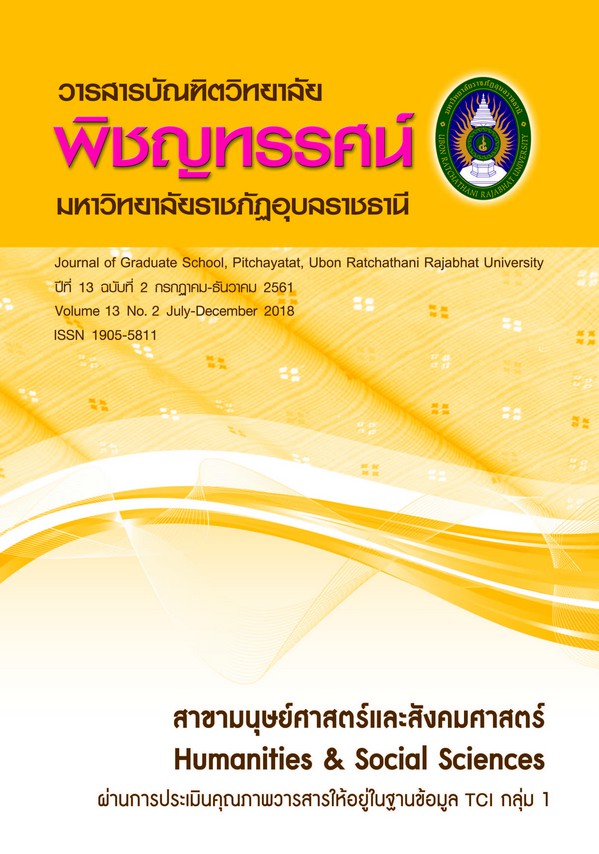การประยุกต์ใช้ปรัชญาเศรษฐกิจพอเพียงในการบริหารกองทุนหมู่บ้าน ตำบลบ้านขาม อำเภอจัตุรัส จังหวัดชัยภูมิ
คำสำคัญ:
ปรัชญาเศรษฐกิจพอเพียง, การบริหารกองทุนหมู่บ้าน, การประยุกต์ใช้บทคัดย่อ
การวิจัยครั้งนี้มีวัตถุประสงค์เพื่อ 1) ศึกษาความรู้ความเข้าใจเกี่ยวกับหลักปรัชญาเศรษฐกิจพอเพียงของคณะกรรมการกองทุนและสมาชิกกองทุนหมู่บ้าน และ 2) ศึกษาการประยุกต์ใช้ปรัชญาเศรษฐกิจพอเพียงในการบริหารกองทุนหมู่บ้าน หมู่บ้านขาม ตำบลบ้านขาม อำเภอจัตุรัส จังหวัดชัยภูมิ การวิจัยครั้งนี้เป็นการวิจัยแบบผสมระหว่างการวิจัยเชิงปริมาณและการวิจัยเชิงคุณภาพ กลุ่มตัวอย่างที่ใช้ในการวิจัย แบ่งออกเป็น 2 กลุ่มตามลักษณะของการวิจัย กลุ่มตัวอย่างสำหรับวิจัยเชิงปริมาณ คือ คณะกรรมการกองทุนหมู่บ้านและสมาชิกกองทุนหมู่บ้านบ้านขาม จำนวน 211 คน กลุ่มเป้าหมายเชิงคุณภาพโดยการสัมภาษณ์เชิงลึก คือ คณะกรรมการบริหารกองทุนหมู่บ้าน จำนวน 11 คน โดยใช้เทคนิคการเลือกแบบเจาะจง เครื่องมือที่ใช้ในการเก็บรวบรวมข้อมูลเชิงปริมาณ ได้แก่แบบสอบถาม สถิติที่ใช้วิเคราะห์ข้อมูล คือ ความถี่ ร้อยละ และค่าเฉลี่ย เครื่องมือที่ใช้ในการวิจัยเชิงคุณภาพ ได้แก่ การสัมภาษณ์เชิงลึก วิเคราะห์ข้อมูลโดยการใช้พรรณนาวิเคราะห์ ผลการวิจัยมีดังนี้ 1. ผลจากการศึกษาความรู้ความเข้าใจเกี่ยวกับหลักปรัชญาเศรษฐกิจพอเพียงของคณะกรรมการกองทุนและสมาชิกกองทุนหมู่บ้าน พบว่า คณะกรรมกรรมการกองทุนและสมาชิกกองทุนหมู่บ้านมีระดับความรู้ความเข้าใจเกี่ยวกับหลักปรัชญาเศรษฐกิจพอเพียงอยู่ในระดับสูง 2. ผลจากการศึกษาการประยุกต์ใช้ปรัชญาเศรษฐกิจพอเพียงในการบริหารกองทุนหมู่บ้านบ้านขาม ตำบลบ้านขาม อำเภอจัตุรัส จังหวัดชัยภูมิ พบว่า มีการประยุกต์ใช้ ดังนี้ 1) ด้านการบริหารคน คณะกรรมการและสมาชิกกองทุนหมู่บ้านยึดหลักความมีเหตุมีผล และมีภูมิคุ้มกันที่ดี คือ มีความซื่อสัตย์ต่อกัน ความไว้วางใจต่อกัน ความเสียสละเพื่อส่วนรวม ความรับผิดชอบร่วมกัน และมีความเห็นอกเห็นใจซึ่งกันและกัน 2) ด้านการเงิน โดยมีลักษณะการประยุกต์ใช้ คือ ความพอประมาณ ไม่ก่อหนี้เกินกำลังที่จะสามารถชำระคืนได้ ด้วยหลักของความมีเหตุมีผล และมีความซื่อสัตย์สุจริตต่อตนเอง ต่อเพื่อนสมาชิก และต่อกองทุน 3) ด้านการบริหารจัดการ โดยยึดหลักความมีเหตุผล ความมีภูมิคุ้มกันที่ดี มีความรอบรู้ รอบคอบ ระมัดระวัง เสียสละ แบ่งปัน และซื่อสัตย์สุจริต
เอกสารอ้างอิง
ฉัตรทิพย์ นาถสุภา. เศรษฐกิจหมู่บ้านไทยในอดีต : พิมพ์ครั้งที่ 4. บริษัทต้นไทรการพิมพ์จำกัด, 2547.
จตุพล ยะจอม. การประยุกต์ใช้แนวคิดเศรษฐกิจพอเพียงของชุมชนในเขตเทศบาลตำบลปาย อำเภอปาย จังหวัดแม่ฮ่องสอน.การศึกษาค้นคว้าอิสระ ปริญญารัฐศาสตรมหาบัณฑิต. มหาวิทยาลัยเชียงใหม่, 2552.
นรินทร์ชัย พัฒนพงศา. การมีส่วนร่วม : หลักการพื้นฐาน เทคนิคและกรณีตัวอย่าง. พิมพ์ครั้งที่ 2. กรุงเทพฯ : ศิริลักษณ์การพิมพ์, 2547.
นิศารัตน์ ทัตตินาพานิช. การประยุกต์ใช้ปรัชญาเศรษฐกิจพอเพียงกับธุรกิจค้าปลีกในจังหวัดหนองคาย. วิทยานิพนธ์ธุรกิจมหาบัณฑิต มหาวิทยาลัยขอนแก่น, 2551.
ภัทรพล ใจเย็น. ความรู้และความเชื่อเกี่ยวกับเศรษฐกิจพอเพียงของพระนิสิตมหาวิทยาลัยมหาจุฬาลงกรณราชวิทยาลัย. วิทยานิพนธ์พุทธศาสตรมหาบัณฑิตอยุธยา : มหาวิทยาลัยมหาจุฬาลงกรณราชวิทยาลัย, 2553.
มานิตย์ สงวนรัตน์. ปัจจัยที่มีผลต่อการกระยุกต์ใช้ปรัชญาเศรษฐกิจพอเพียงในการดำเนินชีวิตของประชาชน อำเภอเมยวดี จังหวัดร้อยเอ็ด. วิทยานิพนธ์ศิลปศาสตรมหาบัณฑิต มหาวิทยาลัยราชภัฏร้อยเอ็ด, 2555.
สุธาพร บำรุงยา และวุฒิชาติ สุนทรสมัย.การประยุกต์ปรัชญาเศรษฐกิจพอเพียงกับการจัดการธุรกิจของผู้ผลิตและจัดจำหน่ายเกษตรอินทรีย์ภายใต้สัญลักษณ์ผลิตภัณฑ์เกษตรอินทรีย์ที่ได้มาตรฐานของประเทศไทย. วารสารการจัดการธุรกิจ มหาวิทยาลัยบูรพา. 4, 1 (ม.ค.-มิ.ย.2558): 72-87.
สุภางค์ จันทวานิช. การวิเคราะห์ข้อมูลในการวิจัยเชิงคุณภาพ. พิมพ์ครั้งที่ 5 กรุงเทพฯ : จุฬาลงกรณ์มหาวิทยาลัย, 2546.
อภิชัย พันธเสน, สรวิชญ์ เปรมชื่น และพิเชษฐ์ เกียรติเดชปัญญา. การประยุกต์พระราชดำริเศรษฐกิจพอเพียงกับอุตสาหกรรมขนาดกลางและขนาดย่อม. กรุงเทพฯ: สำนักงานกองทุนสนับสนุนการวิจัย, 2550.
อุไร เจือหนองคล้า. การประยุกต์ใช้เศรษฐกิจพอเพียงในการเสริมสร้างความเข้มแข็งของกลุ่มอาชีพ : ศึกษากรณีองค์การบริหารส่วนตำบลดอนใหญ่ อำเภอคง จังหวัดนครราชสีมา. รายงานการศึกษาอิสระปริญญารัฐประศาสนศาสตรมหาบัณฑิต มหาวิทยาลัยขอนแก่น, 2552.
ดาวน์โหลด
เผยแพร่แล้ว
รูปแบบการอ้างอิง
ฉบับ
ประเภทบทความ
สัญญาอนุญาต
บทความทุกเรื่องได้รับการตรวจความถูกต้องทางวิชาการโดยผู้ทรงคุณวุฒิภายนอกอย่างน้อย 3 คน ความคิดเห็นในวารสารพิชญทรรศน์เป็นความคิดเห็นของผู้นิพนธ์มิใช่ความคิดเห็นของผู้จัดทำ จึงมิใช่ความรับผิดชอบของวารสารพิชญทรรศน์ และบทความในวารสารพิชญทรรศน์สงวนสิทธิ์ตามกฎหมายไทย การจะนำไปเผยแพร่ต้องได้รับอนุญาตเป็นลายลักษณ์อักษรจากกองบรรณาธิการ





